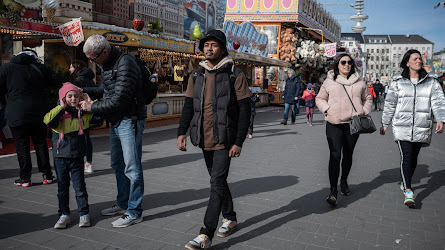When Russia invaded Ukraine, Mohammed Elfatih Ahmed was 18 months from achieving his lifelong dream of becoming a doctor.
Even when missiles started raining down on the Ukrainian port of Odesa, where Mr. Ahmed had come from Sudan to study medicine, he was determined to stay.
''I was close to graduating,'' said Mr. Ahmed, who reached Odesa through years of family savings and a scholarship, and is the only one of 10 siblings to attend university. ''No matter what I knew I could not go back home empty-handed.
He is among 26,000 Africans who were studying in Ukraine before the full scale Russian invasion in February of last year, according to Ukrainian government records.
Thousands of students fled in the early months of the war, among them Mr. Ahmed, but unlike the millions of Ukraiians refugees alongside them, many of the students largely had to fend for themselves.
European countries offered limited support, if any at all, leaving the students to navigate thicket of rules about visas, university credits and possible deportation. For many, going home could be unsafe, and for most it means years of lost hard work and tuition fees, their dreams indefinitely deferred.
Ukraine used to be a popular destination for foreign students, mainly for medicine and engineering, because it offered lower fees and looser visa regulations than many European countries or the United States, as well as the promise of a diploma that could lead to a European career.
But when the war broke out, many African students struggled to get away, with some saying they were pushed to the end of the line at overwhelmed border crossings and forced out of trains and buses. The Ukrainian authorities have denied discriminating.
A year on, many of those students are stuck in limbo, unable to continue their studies either in Europe or their home countries, which often do not recognize Ukrainian university credits.
Determined to finish their degrees, some have decided to return to Ukraine despite the risks.
Those who fled to European Union countries are struggling to manage a complex landscape, and to gather enough money to get by.
In the early days of the war, conflicting rumours were whizzing around and access to official information was scarce, said Mr. Ahmed, 23, making it hard to decide what to do.
After several sleepless nights under the roar of falling bombs, he decided to flee, first to Poland, then to Germany.
''The advice was to get to the border,'' he said.
But for many African students like him, the path has not been as straight-forward as that.
Four million people have fled Ukraine to seek safety in the European Union. The block has granted Ukrainians, as well as foreigners who were long-term residents or refugees there, the right to live, study and work in E.U.nations for three years.
But foreign students were not included, and their legal status was left up to each European country.
Over the course of last year, the block has absorbed the highest number of newcomers since World War II, significantly straining its already overstretched asylum and housing systems.
Some countries, like Belgium or Poland, did not set up any special rules for African students, expecting them to leave or apply for asylum. Others, like Germany or the Netherlands, created programs that allowed them to stay for a limited amount of time, with financial support.
These initiatives are now expiring, plunging students into legal gray zones - and deeper into despair.
The Essay continues. The World Students Society thanks author Monika Pronczuk.

.png)


0 comments:
Post a Comment
Grace A Comment!